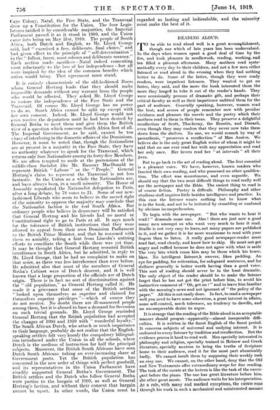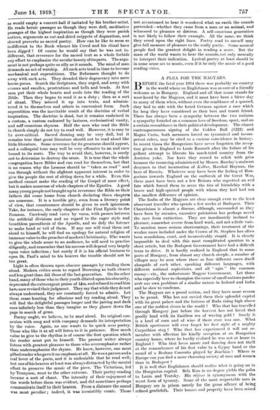READING ALOUD.
T0 be able to read aloud well is a great accomplishment, though one which of late years has been undervalued. In the days when women spent a good deal of time by the fire, and took pleasure in needlework, reading, working, and tea filled a pleasant afternoon. Many mothers read syste- matically every day to their children, and not a few men eitfier listened or read aloud in the evening when they had nothing better to do. Some of the latter, though they were ready readers, were impatient listeners. They wanted to get on faster, they said, and the more the book interested them the more they longed to take it out of the reader's hands. They were occasionally persons of dramatic gift, and perhaps their critical faculty as well as their impatience unfitted them for the part of audience. Generally speaking, however, women read the best, and scores of people remember now with peculiar vividness and pleasure the novels and the poetry which their mothers read to them in their teens. They preserve a delightful recollection of Scott, Thackeray, the Brontss, and Disraeli, even though they may confess that they never now take them down from the shelves. No one, we would remark by way of parenthesis, "preserves a recollection" of Miss Austen. We believe she is the only great English writer of whom it might be said that no one ever read her with any appreciation and read her only once. Her lovers read her "at intervals" all their lives.
But to go back to the art of reading aloud. The first essential is a pleasant voice. We have, however, known readers who fancied their own reading, and who possessed no other qualifica- tion. The effect was monotonous, and even soporific. We should say that the two most difficult things to read really well are the newspaper and the Bible. The easiest thing to read is of course fiction. Poetry is difficult. Philosophy and other studious stuff requires little besides intelligence and practice. In this case the listener wants nothing but to know what is in the book, and not to be irritated by stumbling or confused by obvious incomprehension.
To begin with the newspaper. "But who wants to hear it read ? " demands some one. Alas ! there are just now a good many men amongst us who want very much to hear it read. Braille is not very easy to learn, not many papers are published in it, and we gather it is far more wearisome to read with your fingers than to listen. A really good newspaper-reader must read fast, read clearly, and know how to skip. He most not get angry and ruffled because he does not agree with what is saidr The very bits which rouse him may be those which his hears. likes. No intelligent listener,h owever, likes padding. An eye for padding, for reiteration, for safeguard sentences, and for dullness generally is better worth having than a good voice. This sort of reading should never be in the least dramatic. The only object of the reader should be to make the listener forget that he has not got the print before him, to avoid his instinctive comment of "Oh, get on ! " and to leave him familiar with the morning's news and not ignorant of "the policy of the paper." All this is not easily done. In fact, to read a newspaper well you need to have some education, a great interest in affairs, some self-control, much tolerance, no tendency to dawdle, and no unconquerable desire to argue.
It is strange that the reading of the Bible aloud in an acceptable manner should present—apparently—almost insuperable diffi- culties. It is written in the finest English of the finest period. It concerns subjects of universal and undying interest. It is endeared to every listener by tradition and recollection. But the evidence proves it hard to read well. Men specially interested in philosophy and religion, specially trained in Hebrew and Greek literature, specially anxious to bring the truths of Scripture home to their audience, read it for the moat part abominably badly. We cannot insult them by supposing their weekly task an easy one. We cannot, on the other hand, deny that the Old and New Testaments offer extraordinary scope for fine reading. The task of the curate at the lectern is like the task of the execu- tant before the piano. The one has great literature before him. the other great music. The audience waits for his interpretation. As a rule, with many and marked exceptions, the curate runs through his work in such a mechanical and uninterested manner
as would empty a concert-hall if imitated by his brother-artist. He reads heroic passages as though they were dull, meditative passages of the highest inspiration as though they were parish notices, arguments as cut-and-dried snippets of dogmatism, and shrewd proverbs as sacred poetry. How can he like to seem so indifferent to the Book whence his Creed and his ritual have been digged ? Of course he would say that he was not in- different, that reverence for the sacred text as a whole forbids any effort to emphasize the secularbeauty of itsparts. Theargu. ment is not perhaps quite so silly as it sounds. The mind of man demands an act of worship. All such acts tend in time to become mechanical and superstitious. The Reformers thought to do away with such acts. They dreaded their degeneracy into mere hocus-pocus. Search the Scriptures, they urged, and away with crosses and candles, prostrations and bells and beads. At first men put their whole hearts and souls into the reading of the Bible. Then they began to read it as a duty ; then as a sort of ritual They minced it up into texts, and adminis- tered it to themselves and others in convenient form. Such superstition was the inevitable result of the doctrine of verbal inspiration. The doctrine is dead, but it remains enshrined in a custom, a custom endeared by laziness, ecclesiastical vanity, and self-conscious shyness. Half the men who read the Bible in church simply do not try to read well. However, it is easy to to over.critical. Sacred droning may be very dull, but it remains true that great literature should not be read aloud like little literature. Some reverence for its greatness should appear, and a colloquial tone may well be very offensive to an and ence bound to its seats. The way to avoid that, however, is surely not to determine to destroy the sense. It is true that the whole congregation have Bibles and can read for themselves, but that is no reason why the Lessons should be "taken as read" and run through without the slightest apparent interest in order to give the people the rest of sitting down for a while. Even this method cannot make the reading of the Gospel of none effect, but it makes nonsense of whole chapters of the Epistles. A good manyyoungpeoplenot brqughtup to reverence the Bible as their fathers did come home from church declaring those chapters are nonsense. It is a terrible pity, even from a literary point of view, that countenance should be given to such ignorance. Take, for instance, the early chapters of the First Epistle to the Romans. Carelessly read verve by verse, with pauses between the artificial divisions and no regard to the eager style and breathless parenthesis of the Apostle, and we defy the listener to make head or tail of them. If any one will read them out aloud to himself, he will find an apology for natural religion of immense value to the preacher of modern Christianity. If he wants to give the whole sense to an audience, he will need to practise diligently, and remember that his success will depend very largely upon voice inflection ; but surely if it is his official business to open St. Paul's mind to his hearers the trouble should not be too great.
Light is often thrown upon obscure passages by reading them aloud. Modern critics seem to regard Browning as both clearer and less great than did those of the last generation. On the other hand, many of those who in their youth dilated upon his obscurity, deprecated the extravagant praise of him, and refused to read him Imeenow revised theirjudgment. They say that while they donot always understand, they are constantly forced to admire. Let them cease hunting for allusions and try reading aloud. They will find the delightful passages longer and the jarring and dark ones infinitely lees than they imagine as they glance down the page in search of gems.
Poetry ought, we believe, to be read aloud. Its original con. flexion with song and with company demands its interpretation by the voice. Again, no one wants to be quick over poetry. Those who like it at all will listen to it in patience. How much value to give to the rhythm is of course the first question which the reader must put to himself. The present writer always listens with greatest pleasure to those who overemphasize rather than underemphasize the rhyme. He knew, however, one most gifted reader who gave it no emphasis at all. He was a parson and a real lover of the poets, and it is undeniable that he read well; but one of his hearers at least was always distracted by the mental effort to preserve the music of the piece. The Victorians, led by Tennyson, went to the other extreme. Their poetry-reading became a sort of chant. The intensity of their enjoyment of the words before them was evident, and did sometimes perhaps communicate itself to their hearers. From a distance the sound was most peculiar ; indeed, it was irresistibly comic. Those not accustomed to hear it wondered what on earth the sounds portended—whether they came from a man or an animal, and witnessed to pleasure or distress. A self-conscious generation is not likely to follow their example. All the same, we think they erred upon the right lines. Poetry read to oneself may give full measure of pleasure to the really poetic. Some musical people find the greatest delight in reading a score. But the mass of the world wants to hear the sounds, not only mentally to interpret their indication. Lyrical poetry at least should be in some sense set to music, even if it be only the music of a good reading.vbice.



































 Previous page
Previous page